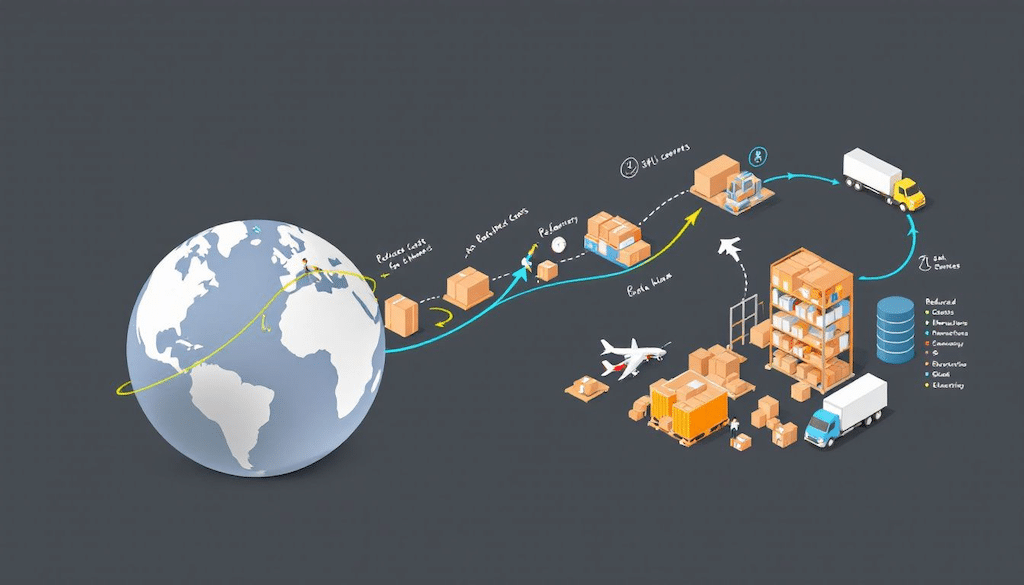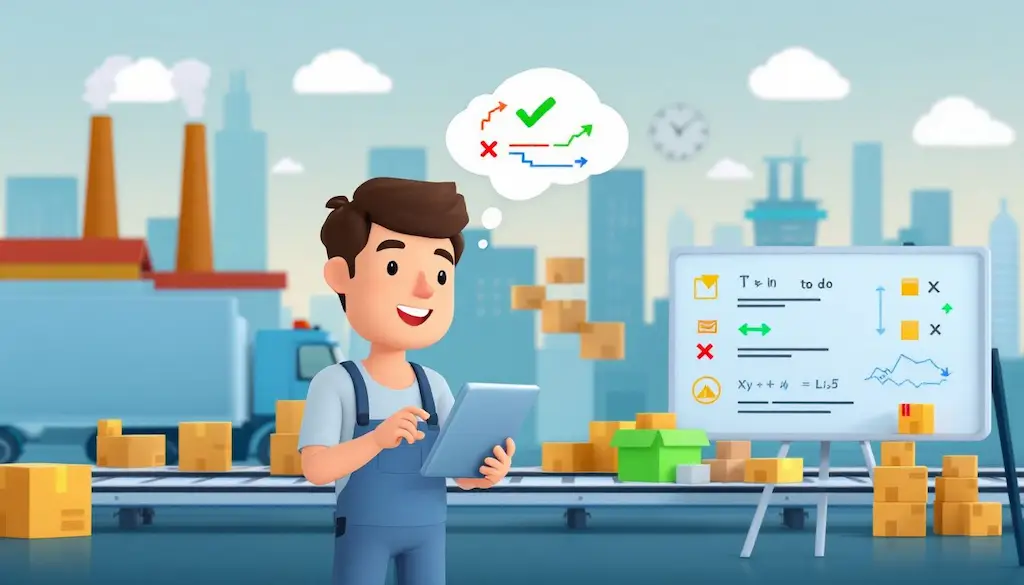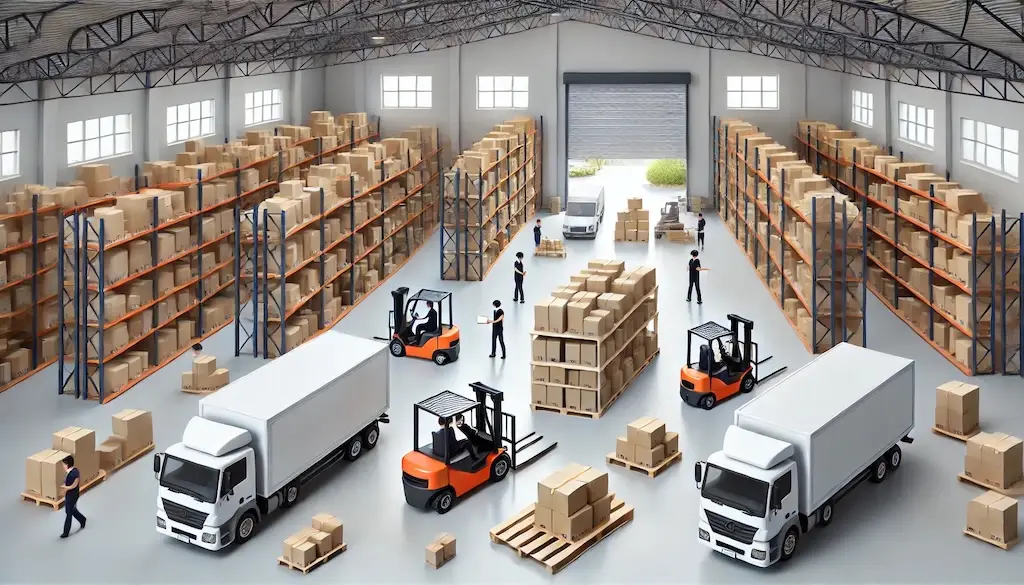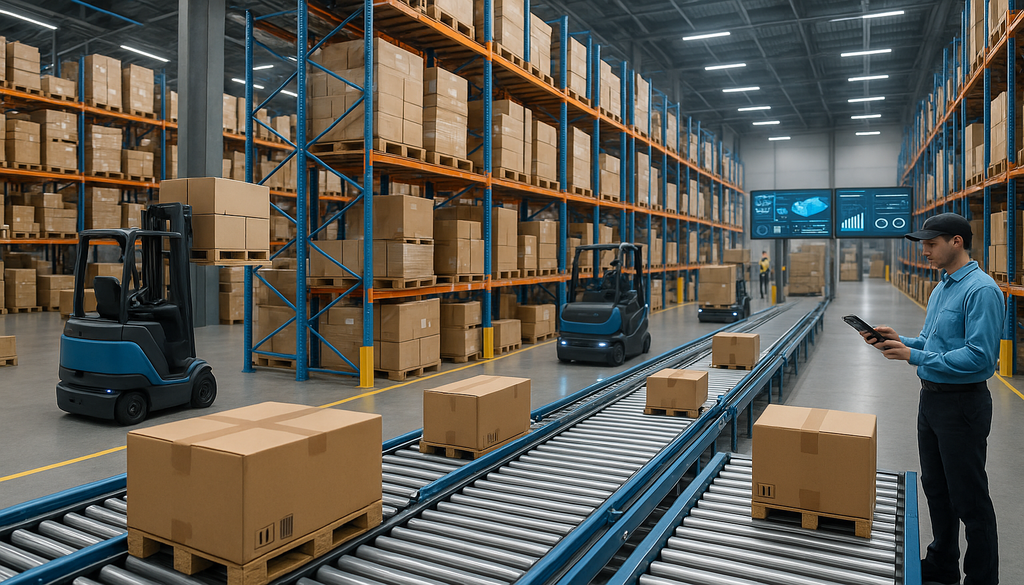A 3PL, or third-party logistics provider, specializes in managing logistics operations such as warehousing, inventory, order fulfillment, and transportation. These providers play a crucial role in optimizing supply chains by increasing efficiency and reducing costs. This article explores the role of 3PLs, the services they offer, and the benefits and challenges they bring to logistics operations.
Key Takeaways
- Third-party logistics (3PL) providers handle key supply chain functions, including inventory management, warehousing, order fulfillment, and transportation, helping businesses enhance operational efficiency.
- There are three main types of 3PLs—asset-based, non-asset-based, and hybrid—each offering different levels of flexibility and service models.
- 3PLs enable businesses to scale operations efficiently, streamline logistics management, and improve order fulfillment and delivery performance.
Defining Third-Party Logistics (3PL)

Third-party logistics (3PL) refers to companies that manage various aspects of supply chain operations, including inventory management, warehousing, order fulfillment, and transportation. These providers go beyond basic logistics services, often integrating advanced technology and automation to enhance efficiency.
The core functions of 3PL providers include storing and managing inventory, processing and fulfilling orders, and coordinating transportation services. By leveraging their expertise, 3PLs help streamline logistics operations, optimize costs, and improve overall supply chain performance. For instance, warehouse-focused 3PLs oversee inventory levels, manage product movement, and ensure timely order fulfillment—critical factors in maintaining an efficient supply chain.
Many 3PLs utilize advanced warehouse management software (WMS) to optimize operations, ensuring accurate inventory tracking, efficient order processing, and seamless integration with e-commerce platforms. These technology-driven solutions enable real-time visibility into inventory levels, improving decision-making and customer service.
By handling complex logistics functions, 3PLs provide scalable solutions that support businesses of various sizes and industries. Whether managing fulfillment for e-commerce brands or coordinating large-scale distribution networks, 3PLs play a crucial role in modern supply chains.
Types of 3PL Providers
There are several types of third-party logistics (3PL) providers, each specializing in different areas of logistics and supply chain management. The primary categories include asset-based, non-asset-based, and hybrid 3PLs. Understanding these classifications helps businesses and logistics providers determine the best approach for their specific operational needs.
Asset-Based 3PLs
Asset-based 3PLs own and operate warehouses, transportation fleets, and other physical logistics infrastructure. Because they control their assets, these providers can directly manage storage, transportation, and distribution processes, ensuring consistency and reliability across the supply chain.
Asset-based 3PLs often operate across full truckload (FTL) and less-than-truckload (LTL) freight services, utilizing various types of equipment such as dry vans, refrigerated trucks, and flatbeds. While their ownership of logistics assets offers stability, their flexibility may be limited compared to providers that can source logistics solutions from a broader network.
Non-Asset-Based 3PLs
Non-asset-based 3PLs do not own warehouses or transportation fleets. Instead, they leverage a network of carriers, warehouses, and digital logistics platforms to provide logistics solutions. These providers specialize in freight brokerage, supply chain coordination, and optimizing logistics through technology-driven solutions.
By using digital freight matching and real-time logistics tracking, non-asset-based 3PLs can offer more flexible and scalable solutions than asset-based providers. While all freight brokers are technically 3PLs, not all 3PLs operate as freight brokers, highlighting the variety of services within this category.
Hybrid 3PLs
Hybrid 3PLs blend the characteristics of both asset-based and non-asset-based providers, offering a versatile approach to logistics management. They may own some assets (such as warehouses or truck fleets) while also partnering with external logistics networks for added flexibility.
This combination allows hybrid 3PLs to provide scalable, customized logistics solutions, making them an attractive option for companies needing both reliability and adaptability. By integrating in-house operations with outsourced capabilities, hybrid 3PLs can support a wide range of logistics requirements.
Core Services Provided by 3PLs

Third-party logistics (3PL) providers offer a range of essential services, including warehousing, inventory management, order fulfillment, and transportation. These services help optimize logistics operations from order receipt to delivery, improving supply chain efficiency and ensuring timely shipments.
Insight: A fourth-party logistics (4PL) provider can enhance these services further by integrating multiple 3PLs, technology platforms, and strategic oversight to provide end-to-end supply chain solutions.
Inventory Management
Effective inventory management is a cornerstone of 3PL operations. Many 3PL warehouses utilize advanced warehouse management systems (WMS) to optimize inventory tracking and streamline fulfillment processes. Real-time inventory visibility allows businesses to monitor stock levels, manage reorder points, and synchronize inventory data across multiple sales channels.
Some 3PLs also offer vendor-managed inventory (VMI), where they take responsibility for monitoring stock levels, forecasting demand, and restocking inventory based on pre-set parameters. These data-driven inventory strategies help reduce stockouts, minimize excess inventory, and improve supply chain efficiency.
Order Fulfillment
Order fulfillment is a core 3PL service that includes receiving inventory, picking, packing, and shipping. The process begins when inventory arrives at a 3PL-managed warehouse, where it is checked, recorded, and stored to ensure accurate tracking.
When an order is placed, automated fulfillment systems and trained warehouse teams handle:
- Order picking – selecting the correct items for each order.
- Packing – optimizing packaging to protect goods and reduce shipping costs.
- Shipping – selecting the most efficient transportation method to meet delivery expectations.
Many 3PLs leverage bulk shipping discounts and carrier partnerships to optimize costs while ensuring fast, accurate deliveries—critical for customer satisfaction and supply chain reliability.
Transportation Services
Transportation management is a vital function of many 3PL providers, covering freight forwarding, full truckload (FTL), and less-than-truckload (LTL) shipping.
- FTL shipping is ideal for businesses shipping large quantities that require a dedicated truckload.
- LTL shipping allows multiple shipments from different businesses to share space in one truck, reducing costs for smaller shipments.
Many 3PLs act as freight brokers or freight forwarders, helping businesses secure cost-effective, optimized shipping solutions. By leveraging digital freight matching platforms, route optimization software, and strategic carrier networks, 3PLs improve supply chain efficiency and delivery reliability.
Advantages of Using a 3PL

Third-party logistics (3PL) providers offer significant advantages, including streamlining supply chain operations, reducing logistics costs, and improving efficiency. These benefits allow businesses to focus on growth, innovation, and customer engagement, while 3PLs handle the complexities of inventory management, order fulfillment, and transportation.
Cost Savings
One of the key advantages of working with a third-party logistics provider is the potential for cost reduction. 3PLs optimize supply chain operations, consolidate shipments, and leverage economies of scale to negotiate better rates with carriers and suppliers.
By managing warehousing, labor, and transportation infrastructure, 3PLs help businesses reduce overhead expenses related to maintaining logistics facilities, staffing, and technology systems. Many 3PLs operate strategically located distribution centers, ensuring faster delivery times and lower last-mile transportation costs.
Enhanced Customer Satisfaction
Timely and accurate deliveries are essential for maintaining customer satisfaction and brand reputation. A well-established 3PL network can enhance fulfillment speed, ensuring on-time deliveries and order accuracy. Some providers even offer same-day or next-day delivery, meeting the increasing demands of e-commerce and retail supply chains.
Many 3PLs provide value-added services, such as:
- Customized packaging and product personalization to enhance brand presentation.
- Real-time tracking updates, automatically syncing shipment details with online stores and order management systems.
- Reverse logistics support, ensuring efficient returns management and minimizing fulfillment errors, which helps reduce return rates and maintain customer loyalty.
Operational Efficiency & Scalability
By managing complex logistics functions, 3PLs enable businesses to scale operations more efficiently. Whether handling seasonal demand fluctuations, expanding into new markets, or optimizing fulfillment processes, 3PLs provide the infrastructure and expertise necessary for growth without heavy capital investment.
Additionally, 3PLs leverage data analytics and supply chain insights to help businesses make informed strategic decisions, optimize inventory planning, and improve overall operational efficiency.
Challenges of Working with a 3PL

While third-party logistics (3PL) providers offer numerous benefits, they also present certain challenges that businesses must navigate. Managing service standards, ensuring data security, and mitigating operational risks are key considerations for both companies utilizing 3PL services and 3PLs optimizing their own operations.
Managing Quality and Service Standards
Service level agreements (SLAs) are crucial for defining performance expectations between 3PLs and their clients. These agreements outline key metrics such as:
- Order accuracy rates (e.g., 99.95% accuracy)
- On-time shipping performance (e.g., 99.98% timely deliveries)
- Return rates and fulfillment efficiency
Regularly monitoring key performance indicators (KPIs) such as on-time delivery, order accuracy, and customer service response times ensures that both businesses and 3PLs maintain high service standards.
Effective communication and defined roles help establish accountability and prevent misunderstandings in logistics partnerships. Additionally, 3PLs with dedicated customer support teams and proactive issue resolution provide better service continuity and reliability.
Data Privacy and Security
As logistics operations become increasingly digital, data privacy and cybersecurity are critical concerns. 3PLs must implement strong security measures to protect customer information, inventory data, and supply chain records from cyber threats.
Key security protocols include:
- Firewalls, encryption, and multi-factor authentication to safeguard digital systems.
- Physical security measures, such as surveillance and restricted warehouse access, to prevent theft or damage.
- Staff background checks and compliance protocols to enhance trust and security in operations.
Additionally, backup power and internet systems help prevent disruptions, ensuring continuous operations and data protection in case of outages.
Dependency on External Providers
Relying on a single 3PL provider can pose risks, such as service disruptions, compliance issues, or scalability limitations. To mitigate these risks, businesses and 3PLs alike may adopt multi-provider strategies, diversifying logistics operations across multiple carriers, fulfillment centers, or technology solutions.
By establishing strong communication channels and contingency plans, businesses can improve supply chain resilience and reduce dependency on any single logistics provider.
Choosing the Right 3PL Provider

Selecting a third-party logistics (3PL) provider involves several key considerations, including industry expertise, technology capabilities, and geographical reach. These factors play a crucial role in ensuring that a 3PL can effectively support and scale logistics operations while maintaining efficiency and service reliability.
Evaluating Expertise and Experience
A 3PL’s industry expertise and experience are critical factors in determining its ability to manage complex logistics operations. Providers with a strong reputation and proven track record demonstrate reliability and operational excellence.
Other key evaluation criteria include:
- Customer support capabilities – Assess responsiveness, issue resolution efficiency, and real-time tracking capabilities.
- Industry-specific experience – A 3PL familiar with specialized logistics needs (e.g., cold storage, hazardous materials, high-volume fulfillment) will better align with operational requirements.
- Scalability and flexibility – Ensure the provider can adjust to changing demand levels and accommodate business growth.
Technology Integration
A 3PL’s ability to integrate with advanced logistics technologies is essential for real-time inventory tracking, automated fulfillment, and seamless supply chain visibility.
Technology-driven 3PLs often utilize:
- Warehouse management systems (WMS) for optimized storage and inventory control.
- Radio frequency identification (RFID) and barcode scanning for real-time inventory accuracy.
- Transportation management systems (TMS) to enhance freight coordination and route optimization.
Seamless integration with enterprise resource planning (ERP) systems, e-commerce platforms, and automated analytics tools ensures that logistics operations remain efficient and scalable.
Geographical Reach
A 3PL’s geographical reach directly impacts shipping times, delivery efficiency, and overall logistics costs. A provider with strategically located distribution centers can support faster deliveries while reducing transportation expenses.
Factors to consider when evaluating network reach include:
- Proximity to key markets – Ensures reduced shipping distances and improved customer service.
- Carrier partnerships and freight consolidation capabilities – Enables cost-effective shipping and optimized routing.
- Multi-region or international logistics capabilities – Expands operational flexibility for businesses with global distribution needs.
Ensuring a balance between network scale, service quality, and cost efficiency allows businesses to build a resilient and adaptable supply chain.
Value-Added Services Offered by 3PLs
In addition to core logistics functions, third-party logistics (3PL) providers offer a range of value-added services that enhance supply chain efficiency, product handling, and customer experience. These services go beyond traditional warehousing, order fulfillment, and transportation, providing operational flexibility and competitive advantages.
Kitting and Customization
Kitting refers to the process of assembling multiple components or SKUs into a single package before shipment. This service streamlines fulfillment operations, reduces packaging complexity, and enhances order accuracy—making it especially valuable in e-commerce, subscription box services, and retail logistics.
Many 3PL providers also offer product customization, including:
- Personalized packaging to create a branded unboxing experience.
- Special inserts or promotional materials for marketing campaigns.
- Light assembly or product modifications before final shipment.
These customization capabilities help brands differentiate their products, improve customer engagement, and increase brand loyalty.
Expedited Shipping
Fast and reliable shipping options are essential for maintaining customer satisfaction and meeting growing delivery expectations. Many 3PLs leverage their warehouse networks, carrier partnerships, and technology-driven logistics to provide expedited shipping services.
Some 3PLs offer:
- Same-day shipping, where orders placed before a cutoff time (e.g., 5 p.m.) are processed and dispatched within hours.
- Next-day and two-day delivery options, optimizing fulfillment to reduce transit times.
- Zone-based fulfillment strategies, ensuring products ship from the closest warehouse to the final destination.
By integrating real-time tracking and automation, 3PLs optimize shipping speeds while keeping costs manageable.
Reverse Logistics
Reverse logistics is a crucial component of supply chain efficiency, ensuring that returns, exchanges, and product recalls are managed smoothly.
Key reverse logistics services offered by 3PLs include:
- Processing returned goods and restocking inventory.
- Repairing, refurbishing, or repackaging products for resale.
- Proper disposal or recycling of unsellable items based on compliance regulations.
Seamless returns management helps businesses reduce losses, minimize processing times, and improve customer satisfaction—especially in industries with high return rates, such as e-commerce and retail.
How ASC Software Enhances 3PL Operations
For over 30 years, ASC Software has been delivering industry-leading supply chain solutions designed to meet the complex demands of warehouse, distribution, manufacturing, and 3PL operations. Our advanced Warehouse Management System (WMS), Warehouse Control System (WCS), and Manufacturing Execution System (MES/MRP) empower 3PL providers with the tools needed to streamline logistics, optimize inventory, and enhance fulfillment accuracy.
Key Solutions for 3PL Providers
- Warehouse Management System (WMS) – Achieve real-time inventory control, precise order fulfillment, and seamless warehouse operations with an AI-driven WMS designed to handle multi-client 3PL environments.
- Warehouse Control System (WCS) – Integrate automation, robotics, and material handling equipment to enhance warehouse efficiency, optimize workflows, and reduce labor costs.
- Manufacturing Execution System (MES/MRP) – Manage production planning, resource allocation, and order tracking for 3PLs handling light manufacturing, kitting, or value-added services.
Why 3PLs Choose ASC Software?
- Multi-Client & Scalable Solutions – Manage multiple warehouses, fulfillment centers, and customer accounts seamlessly in one system.
- Seamless System Integration – Connect with ERP, e-commerce, and transportation management (TMS) platforms to enable end-to-end supply chain visibility.
- Real-Time Data & Automation – Optimize operations with advanced analytics, automation tools, and AI-driven insights.
- Compliance & Security – Ensure regulatory compliance, cybersecurity protection, and industry best practices for secure logistics operations.
By leveraging ASC Software’s comprehensive supply chain solutions, 3PL providers can enhance efficiency, reduce costs, and scale their operations, ensuring they stay ahead in today’s fast-moving logistics landscape.
Summary
In conclusion, third-party logistics (3PL) providers play a vital role in modern supply chain management, offering services that enhance efficiency, reduce costs, and improve customer satisfaction. From inventory management and order fulfillment to transportation and value-added services, 3PLs help businesses optimize logistics operations and streamline their supply chains.
For 3PL providers, leveraging the right technology is essential to staying competitive. Advanced WMS, automation, and integrated logistics solutions empower 3PLs to enhance service levels, scale efficiently, and adapt to evolving supply chain demands.
As the logistics landscape evolves, 3PLs that embrace innovation and technology will be best positioned for long-term success.
Streamline Your 3PL Operations with ASC Software – Contact us today to see how our supply chain solutions can optimize your logistics.
Frequently Asked Questions
What is third-party logistics (3PL)?
Third-party logistics (3PL) refers to companies that manage logistics operations, including warehousing, inventory management, order fulfillment, and transportation. Many businesses and retailers rely on 3PL providers to streamline their supply chains, improve efficiency, and scale their logistics operations.
What is the difference between a warehouse and a 3PL?
A warehouse is primarily used for storage, while a 3PL provider offers a broader range of logistics services. In addition to storing inventory, a 3PL manages order fulfillment, shipping, returns processing, and often integrates with supply chain technology for end-to-end logistics management.
What is an example of a 3PL company?
Examples of third-party logistics providers (3PLs) include UPS Supply Chain Solutions, FedEx Logistics, and DHL Supply Chain, which manage warehousing, freight transportation, and order fulfillment. Many industry-specific 3PLs specialize in e-commerce, cold storage, retail distribution, and omnichannel fulfillment.
What is 3PL in simple terms?
A 3PL (third-party logistics provider) is a company that handles warehousing, order fulfillment, and shipping for businesses. Many 3PLs also provide inventory management, freight brokerage, and technology integration to optimize logistics operations.



